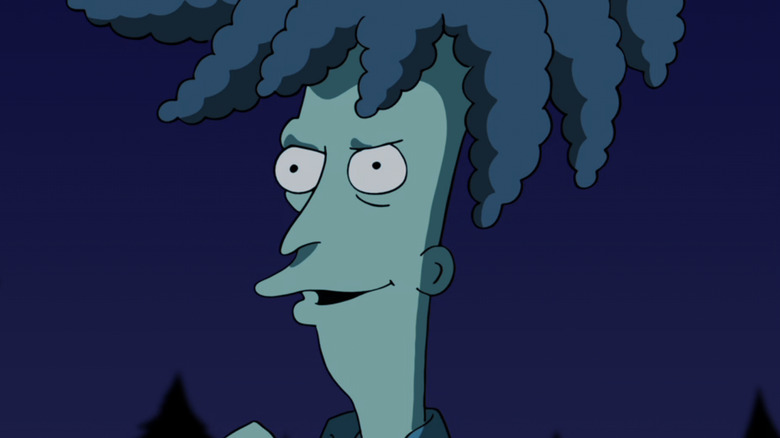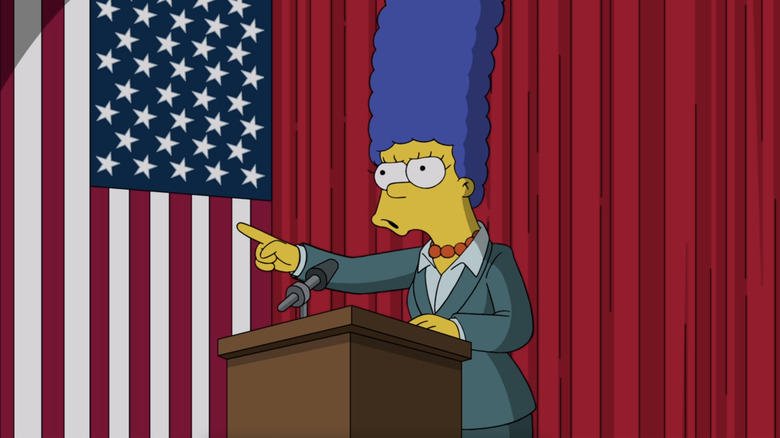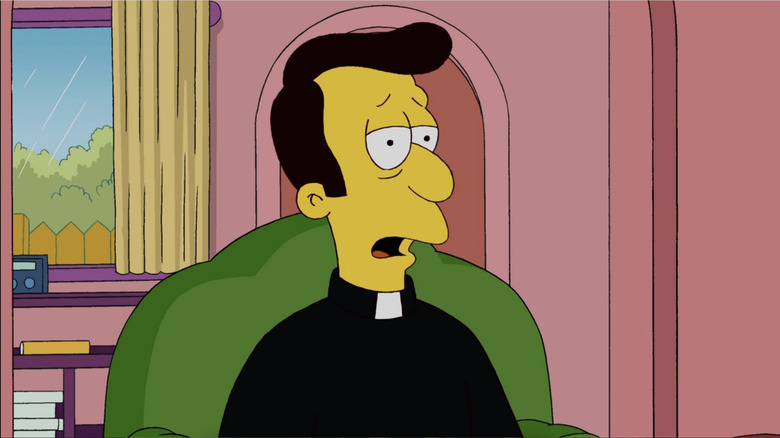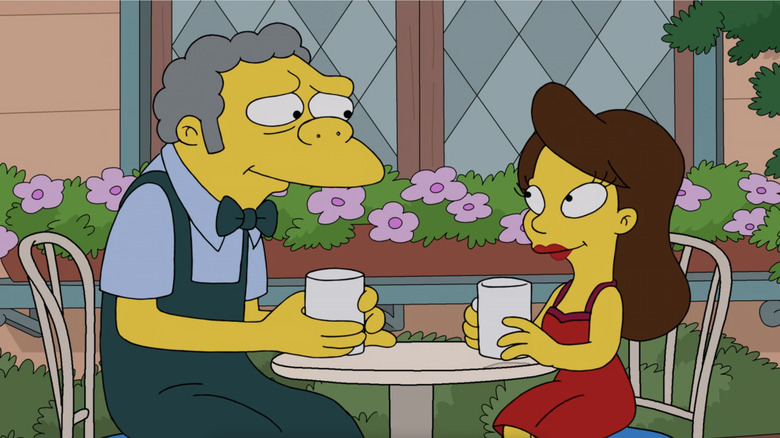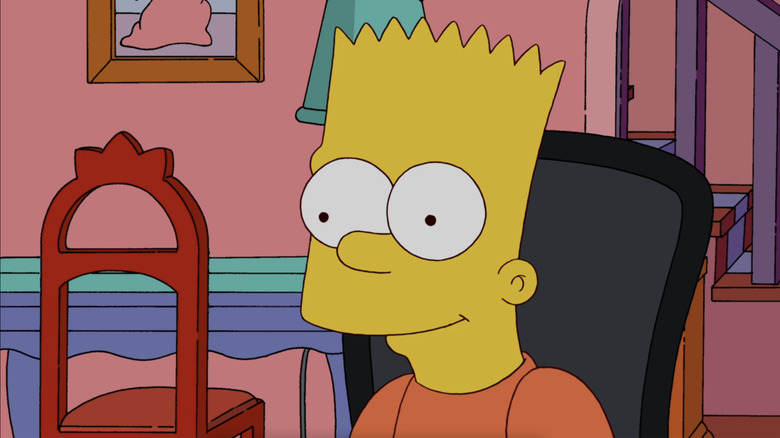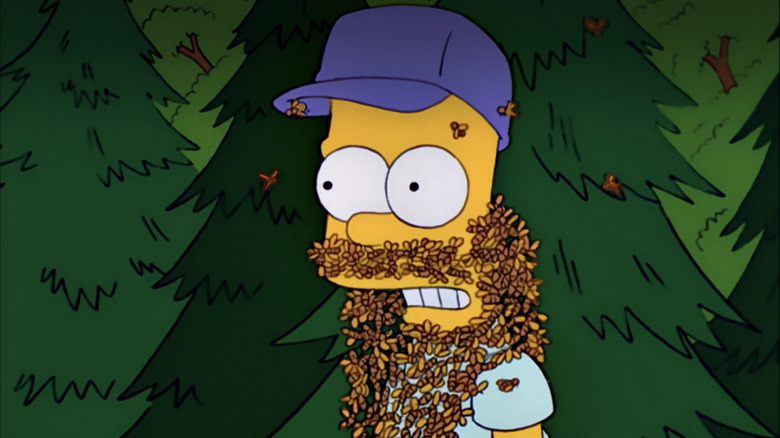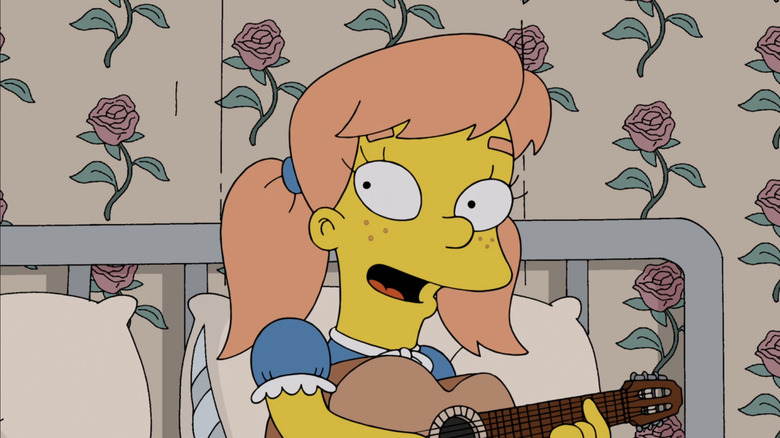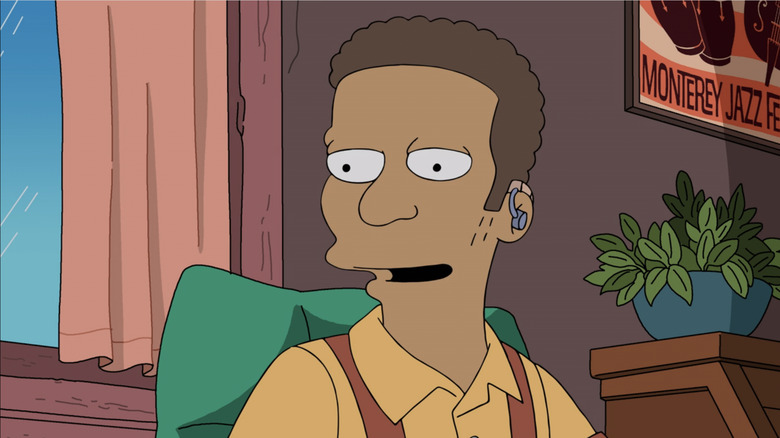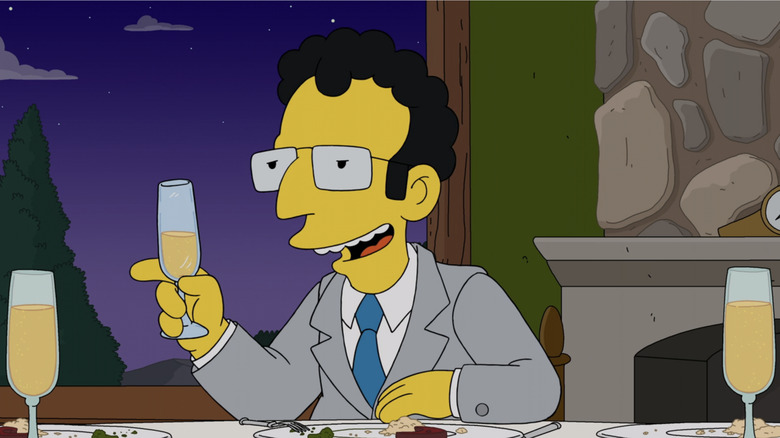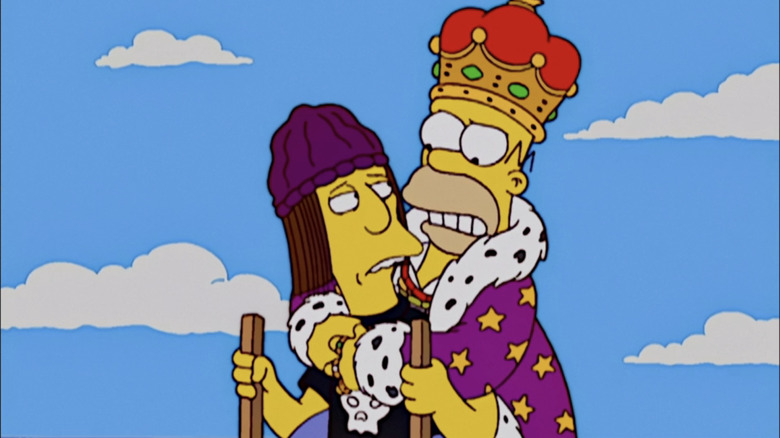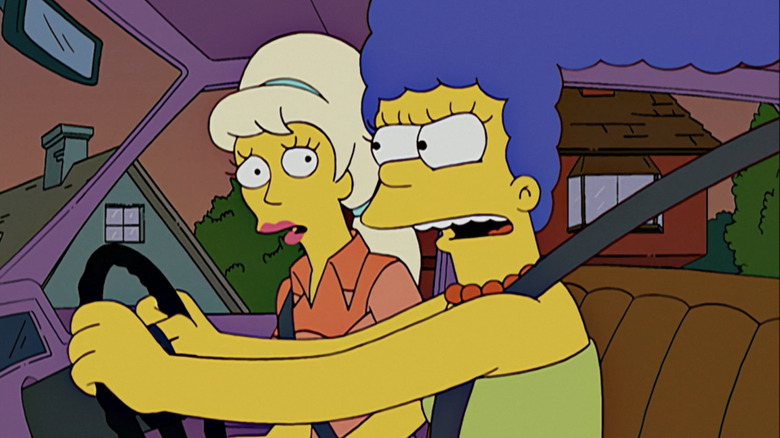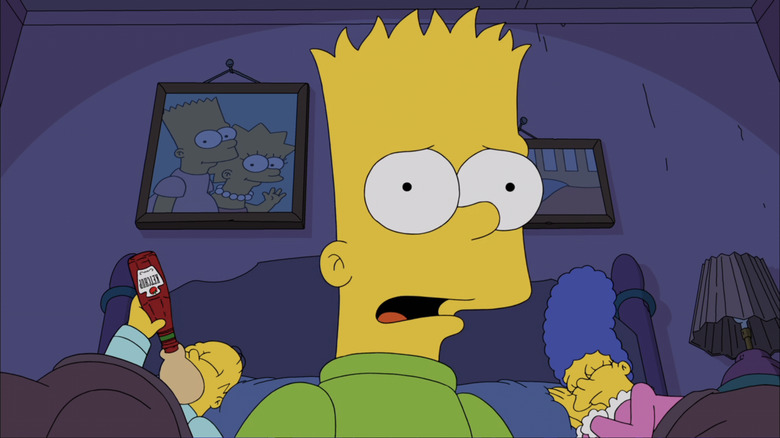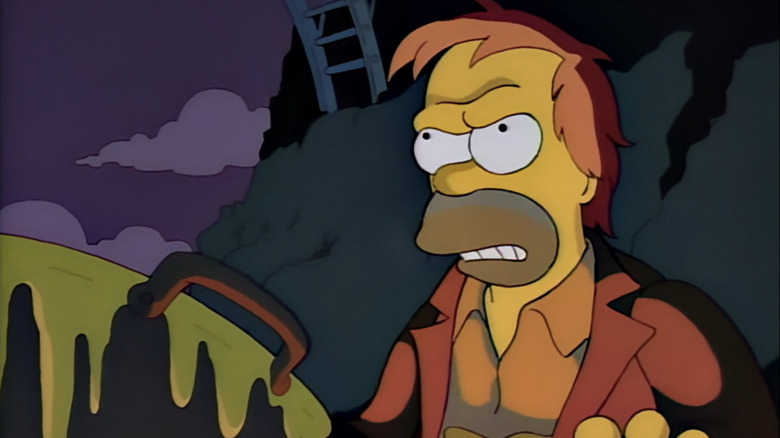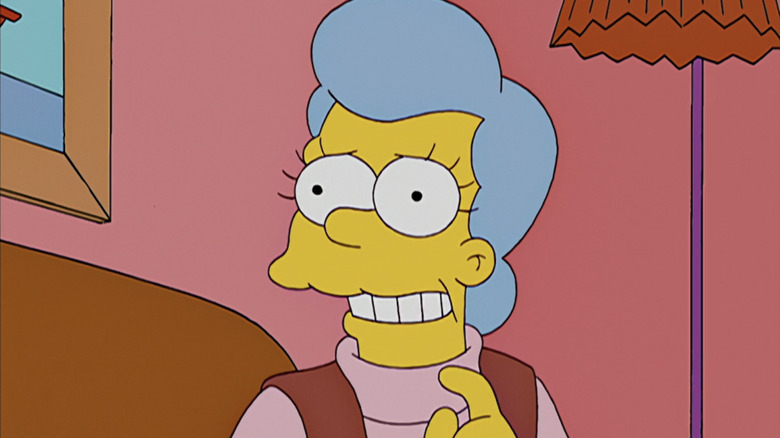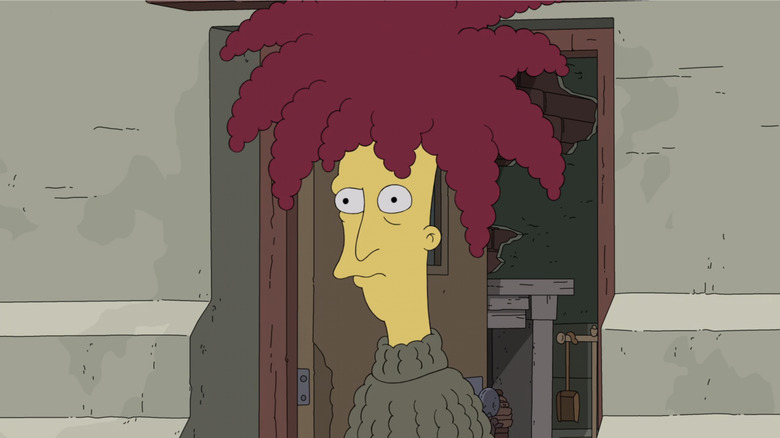Rare Times The Simpsons Actually Made Sequel Episodes
Most sitcoms operate with a soft reset button. No matter how wild a plot might be in any particular episode, the status quo of the series is always restored by the episode's end, and/or the events are simply ignored in subsequent episodes. Gilligan and the rest of the castaways are never any closer to getting off the island from one episode to the next, and no matter how many disasters he causes in the Winslow home, Steve Urkel is always welcomed back in the next week. "The Simpsons" is extremely faithful to the reset-button concept: not only has Springfield, USA gone mostly unchanged since the show first broadcast in 1989, but its characters haven't aged. Bart Simpson remains an eternal 10-year-old boy; in real life, he'd be in his early 40s by now.
But every so often the show will reach back into its storied history and make an episode that directly follows up on a previous episode, years or even decades later. Some of these are quick nostalgia grabs, others check in on a beloved (or controversial) guest character from years past, and still others have kept one particular storyline going long after its natural end date. Here are the rare times "The Simpsons" actually made sequel episodes.
The Old Blue Mayor Ain't What She Used to Be
Season 29's "The Old Blue Mayor Ain't What She Used to Be" is mainly about Marge running for mayor against Mayor Quimby. After Quimby makes a sexist remark at a town hall meeting, an irate Marge challenges him in the upcoming election and wins with a promise to finally extinguish the famous Springfield tire fire. When it comes time to make good on that promise, Marge discovers that being a politician is more complicated than it seems.
The impetus for that town hall meeting is a disaster involving the remnants of the Springfield monorail, as seen in the all-time classic Season 4 episode "Marge vs. the Monorail." After the train goes out of control at the end of that Conan O'Brien-scripted episode, the city apparently transforms the track into an elevated park a la the High Line in New York City. The opening ceremony for the park accidentally powers up one of the remaining cars, causing a crash that kills the original episode's (non-Batman) scientist Sebastian Cobb and destroys a statue of the late Leonard Nimoy. There's not much about the monorail after that opening sequence, though both episodes feature Marge's civic-minded streak.
Wedding for Disaster
A visit from the area's Bing Crosby-esque parson in Season 20's "Wedding for Disaster" reveals that Rev. Lovejoy was accidentally unlicensed for several months, making any ministerial duties performed during that time invalid — including Marge and Homer's second marriage from Season 8's "A Milhouse Divided." In that episode, Homer, fearing that he will suffer the same fate as Milhouse's recently divorced father Kirk, divorces Marge so that they can get married all over again. With the revelation that their second marriage wasn't sanctified, Marge takes the opportunity to plan the wedding she's always dreamed of, only to transform into a literal bridezilla. When Homer doesn't show up for the ceremony, Marge fears that her demanding ways and short temper scared him off, but in reality, certain interested parties have kidnapped Homer in order to keep the wedding from happening.
As with "The Old Blue Mayor," the episode uses its connection to a previous episode to introduce a mostly unrelated plot, though it does include a cameo from someone we'll see later in the list, Sideshow Bob. When Bart and Lisa find an "SB" keychain at the scene of Homer's kidnapping, they immediately suspect their old nemesis, but it turns out that he's innocent, having spent the day with his former nemesis, Krusty the Clown, sculpting and watching "The House of Sand and Fog."
The Wayz We Were
When a new traffic app causes daily traffic jams outside of Evergreen Terrace, Homer and Marge call a neighborhood meeting to address the disturbance, only to find that the rest of the street finds them to be the greater disturbance. But the traffic jam storyline in Season 33's "The Wayz We Were" is just the introduction to the main plot, Moe's reunion with ex-girlfriend Maya from Season 20's "Eeny Teeny Maya Moe." In that episode, Moe and Maya's blossoming romance comes to an end when Moe can't quite get over the fact that Maya is a little person; he makes short jokes long after they've been funny and is at first embarrassed to introduce her to his friends.
Here, though, Moe isn't about to make the same mistake twice. Not only does Moe refrain from any short jokes, but the entire episode also does. The most notable thing about her is that she is inexplicably attracted to Moe. As they get closer, Moe fears that he'll once again mess things up, and the voices in his head — represented by a mirror full of horror villains — taunt him with every horrible thing he thinks about himself. But Moe is able to shut the voices out and finally put a ring on Maya's finger; whether their engagement and/or marriage will become a permanent storyline remains to be seen.
Angry Dad: The Movie
Season 13's "I Am Furious Yellow" introduced the world to "Angry Dad," the show's take on the late-'90s web cartoon "Angry Dad" featuring a crudely animated Homer getting uncontrollably angry at every little thing. The cartoon, written and animated by Bart, becomes an unexpected hit, leading Homer to reconsider his relationship to rage and attempt to be more mindful — that is, until a series of events turns him into the Incredible Hulk. Nine years later, "Angry Dad" returns in Season 22's "Angry Dad: The Movie." When the cartoon's current rights holder (an office chair company) wants to make a movie out of Angry Dad, the resulting short becomes an awards darling. As the accolades keep rolling in, Bart becomes jealous that Homer is hogging all the attention.
The episode doesn't really follow up on the themes of "I Am Furious Yellow." For one thing, Homer never really gets angry in this episode, which is perhaps a commentary on the way Homer was written in 2011 as opposed to 2002. The bulk of the jokes come from the episode clowning on awards shows and its own genre, parodying "The Triplets of Belleville," "Wallace and Gromit," and the awards domination of Pixar, among others. Ricky Gervais guest stars in a fairly brutal send-up of himself.
Brawl in the Family
The Simpsons have always had anger issues; Homer is well known for choking the life out of Bart whenever possible, but the entire family has been in on the act from the very beginning, going back to Season 1's "There's No Disgrace Like Home." In Season 13's "Brawl in the Family," their violent behavior toward each other reaches a tipping point, and a no-nonsense social worker (Delroy Lindo) is brought in to set the family straight via a weekend wilderness retreat. Amazingly, the weekend works and the family returns home in a more respectful, loving state — until Homer and Ned's second wives show up.
Three seasons earlier in "Viva Ned Flanders," Homer took Ned on a whirlwind trip to Vegas, where they drunkenly married a couple of Sin City floozies, Ginger and Amber. The ladies find their way to Springfield and make themselves at home. Ned and his boys Rod and Todd welcome Ginger into their Maude-less (see below) home with smothering good cheer, while Amber makes Homer sandwiches in the treehouse after Marge throws him out. In the end, the Flanders life is too much for Ginger, and Amber is aghast when Homer gets her drunk and marries her off to Grandpa. They run back to Vegas, where there are "poker games [they] can be won in."
I'm Goin' to Praiseland
One of the show's rare permanent changes came in Season 11's "Alone Again, Natura-Diddily" when the show killed off Maude Flanders after a contract dispute with actress Maggie Roswell. Her death has been referenced throughout the rest of the series, as in "Brawl in the Family" and Ned's long-running romance with Mrs. Krabappel. But Ned's widowhood and bereavement are rarely the focus of an episode, with the exception of Season 12's "I'm Goin' to Praiseland." When a would-be tryst with a beautiful contemporary Christian singer (Shawn Colvin) ends with Ned cutting her hair in the night to make her look like Maude, everyone realizes that he needs some help moving on. In the process of cleaning out Maude's belongings, Ned finds an old sketchbook of Maude's that includes designs for a religious theme park called Praiseland. Inspired, he works to make Maude's dreams into reality.
Once the park is complete, Ned makes an incredible discovery: When people get near the giant statue of Maude at the center of the park, they experience incredible visions. Visitors flock to see this supposed miracle until Ned is informed that the visions are being caused not by divine intervention, but by a gas leak. Praiseland is closed, and with it, Ned is able to move on with his life.
Clown in the Dumps
Like Maude's death, the detail of Krusty the Clown being Jewish has remained a constant since it was first introduced in Season 3's "The Jazz Singer" spoof "Like Father, Like Clown." Season 15's "Today I Am a Clown" continues the story of Krusty's reconciliation with both his faith and his father, Rabbi Hyman Krustofsky (Jackie Mason). In "Like Father, Like Clown," it's revealed that Hyman disowned his son, but in the later episode we find that the rift runs even deeper than that: Because of his clowning ways, Krusty never received a bar mitzvah.
Mason appeared a few more times in bit parts as Rabbi Krustofsky, but the saga of Krusty and his father came to a close in Season 26's premiere episode "Clown in the Dumps." After a celebrity roast leaves him depressed over the state of his career, Krusty visits the rabbi, only for Hyman to admit that he never found his son particularly funny, and then dying immediately after. Crushed by the fact that he never won his father's approval, Krusty goes into a drunken tailspin and has a vision of "Jewish Heaven," where his father implores him to make something of his life. This would be Mason's final appearance on the show; he died in 2021.
Love Is a Many-Splintered Thing
Like Jackie Mason as Rabbi Krustofski, many of the show's sequel episodes are built around notable guest characters and/or stars. One of the most recent of these is Zooey Deschanel as Cletus the slack-jawed yokel's talented daughter, Mary Spuckler. First appearing in Season 19's "Apocalypse Cow," Mary helps Bart raise a calf for the 4-H Club, but their burgeoning romance soon turns very serious when the Spucklers interpret Bart's gift of the now-grown cow as a marriage proposal.
Five years later, the show begins Season 24 with "Moonshine River," in which the family takes a lovelorn Bart to New York to find Mary, who has been living the life of a glamorous urbanite. Later in that same season, "Love Is a Many-Splintered Thing" has Mary back in Springfield, as Bart narrates their brief rekindled romance from some future point a la Woody Allen in "Annie Hall." He wins her back only to lose her once again. It seems Bart and Mary's relationship will never quite work, although there's nothing to stop Deschanel from returning to Springfield for one more song.
The Sound of Bleeding Gums
One of the most affecting episodes in the show's first season is "Moaning Lisa," in which a despondent Lisa runs away from home and receives some much-needed advice from an itinerant saxophone player named Bleeding Gums Murphy (Ron Taylor). Bleeding Gums and Taylor would return in the equally emotional Season 6 episode "'Round Springfield." Lisa reconnects with her ailing mentor after Bart winds up in the hospital with appendicitis. When Bleeding Gums dies alone, a devastated Lisa makes it her business to spread his music far and wide.
Taylor died in 2002, so Kevin Michael Richardson took over the role as a ghost and in flashbacks for Season 33's "The Sound of Bleeding Gums." When she hears Bleeding Gums' music on a commercial for the lottery, an enraged Lisa sets out to return the rights to his music to his son Monk, who is hard of hearing (voiced by deaf actor John Autry II). While Lisa's intentions are good, her ego once again gets in the way, as her need to "save" Bleeding Gums ignores the wishes of his own son. In the end, Lisa learns a poignant lesson.
Hail to the Teeth
Jon Lovitz's obnoxious Artie Ziff has been a thorn in the sides of Homer and Marge since they were in high school. As seen in the Season 2 flashback episode "The Way We Was," Artie asks Marge to the senior prom. He dazzles Marge's parents and sisters (as opposed to her previous date, Homer, who horrified them), but when he forces himself on her in his car, she rebuffs him. Artie would appear briefly in the Season 4 episode "The Front," voiced by Dan Castellaneta, but Lovitz wouldn't revisit the role until Season 13's "Half-Decent Proposal," in which a now-wealthy Artie offers Marge $1 million to spend a weekend with him, which Marge reluctantly accepts. Of course, Homer is the only man for Marge, a fact that Artie sadly accepts by the end of the episode.
Two seasons later, a now-broke Artie is discovered living in the Simpsons' attic in "The Ziff Who Came to Dinner." Having lost his company in the 2000s dot-com bust, he turns to the family for help, but soon is revealed to have ulterior motives. Artie's prime motivation is always his life-long lust for Marge, which reaches its ultimate form in the Season 31 episode "Hail to the Teeth." Once again fabulously wealthy, he invites Marge and Homer to his lavish wedding (via hologram); at the ceremony, they are shocked to discover that Artie's "bride" is an exact robotic replica of Marge. The entire wedding was a sham in order to make Marge jealous and spur her nonexistent feelings for him.
The Great Louse Detective
Season 14's "The Great Louse Detective" starts as one kind of sequel, but reveals itself to be another. Someone is trying to kill Homer. Considering the laundry list of enemies he's accrued over the years — including George H.W. Bush, the emperor of Japan, and the entire state of Florida — the culprit could literally be anyone, so Chief Wiggum consults the one man in town with the most experience in trying to kill a Simpson: Sideshow Bob. Soon, Homer and Bob are on the trail of the would-be killer together, only to discover that it is local mechanic Junior, also known as Frank Grimes, Jr.
Junior's father, of course, is Frank Grimes, the titular character of the controversial Season 8 episode "Homer's Enemy." Grimes, a new employee at the power plant, is shocked and enraged by Homer's life of unexamined privilege and zero consequences. Having reached his breaking point, Grimes (or Grimey, as he liked to be called) puts his hands on a live wire without protection and electrocutes himself to death. It's a bracingly dark and self-critical episode, one that has divided fans for 25 years. Grimes doesn't appear to have a family, which is explained away in "The Great Louse Detective" by making Junior's mother an anonymous *** worker — one last indignity for Grimey to suffer.
Papa Don't Leech
One night after another fight with Marge, Homer finds himself in a hillbilly bar drinking a bottle of Fudd (the rural counterpart to Duff beer) when the bar's waitress Lurleen (Beverly D'Angelo) gets up on stage and sings a beautiful country song. Transfixed, Homer becomes her manager, much to the tooth-grinding chagrin of Marge. Caught between a bewitching chanteuse and his family, Homer does the right thing and comes home, leaving Lurleen to pine for him on the country-fried variety show "Ya Hoo."
That was Season 3's "Colonel Homer." Lurleen would pop up in the background every so often after that, most notably in Season 4's "Marge vs. the Monorail" (voiced by the late Doris Grau), but she and D'Angelo made their official return in Season 19 with "Papa Don't Leech." On the hook for $50,000 in back taxes, a destitute Lurleen goes to Homer and Marge for help. After listening to her songs of neglect, they try to reunite her with her deadbeat father — only for him to steal her songs and sell them to the Dixie Chicks (appearing as themselves). In the end, Lurleen has a new lease on life, and she and Marge have reconciled — up to a point.
Kamp Krustier
Season 28's "Kamp Krustier" is, as the title suggests, a sequel to Season 4's "Kamp Krusty," in which Bart and Lisa attend, and eventually overthrow, a cheap and dangerous Krusty-branded summer camp. But rather than revisiting the story (and location) with the distance of years and seasons at least half-acknowledged (as in the Artie Ziff episodes), "Kamp Krustier" takes a unique approach, dropping back in almost immediately after the original episode ended. Bart and Lisa return from camp at the end of summer (though there's no mention of Krusty taking the kids to Tijuana), clearly traumatized from the experience. Though Bart plays up his PTSD in order to get out of going to school, he soon realizes that he and Lisa are repressing terrible memories involving another kid who possibly died at camp.
Meanwhile, Homer and Marge are dealing with their own fallout from Kamp Krusty. As we saw in the original episode, their marriage and love life became stronger than ever when the kids were away. Now, without having time or space for each other, Marge becomes increasingly frustrated, while celibacy turns Homer into a brainy go-getter. To face their demons, the family returns to Kamp Krusty, which has been remodeled into an adults-only retreat. Bart and Lisa discover that their repressed memories are real, but that the "kid" they thought had died was actually an adult investigative reporter.
Brother Can You Spare Two Dimes?
The show's very first sequel, "Brother Can You Spare Two Dimes?" from Season 3 continues the story begun in Season 2's "Oh Brother, Where Art Thou?" After Grampa reveals that he had an illegitimate son who was given up for adoption, Homer tracks down his long-lost brother, wealthy Detroit automaker Herb Powell (Danny Devito). Herb welcomes his new family with open arms and even offers Homer a job designing a new car for the common man. When that car, called The Homer, turns out to be a hideous eyesore, Herb is left ruined.
A year later in "Brother Can You Spare Two Dimes?" Herb is a hobo living under a bridge, but still dreams of finding a million-dollar idea and getting back on top. When he sees that Homer has won a $2,000 award from the power plant (really a settlement for the plant making him sterile), Herb seeks out his brother and asks for the money as an investment in his latest idea, a translator that deciphers what babies mean when they coo and babble. Other than a quick voicemail cameo in the Season 24 episode "Changing of the Guardian," neither Herb nor Devito has been on the show since Season 3.
Mothers and Other Strangers
Homer's deceased mother had occasionally been seen via flashbacks in "Oh Brother, where Art Thou?" and Season 6's "Grampa vs. Sexual Inadequacy," but her story did properly begin until "Mother Simpson" in Season 7. After faking his death to get out of a work obligation, Homer receives an unexpected visitor: his mother Mona (Glenn Close), long thought to be dead herself. It turns out that Mona is a hippie radical on the run for the last 30 years after a protest at Mr. Burns' chemical weapons laboratory made her a fugitive. Mona gets to meet her daughter-in-law and grandchildren, but must return to life underground in order to keep her family safe. The episode ends on a rare note of bittersweet reflection for Homer.
"Mother Simpson" could have been the last we ever saw of Mona, and possibly should have been, but eight years later in Season 15, Mona resurfaces in "My Mother the Car(Jacker)," in which an attempted car theft puts Mona in front of a judge for all the crimes she has committed. The family comes to her aid, but she appears to die following a high-speed pursuit by the police. Only Homer believes that she's still alive — a belief validated in Season 19's "Mona Leaves-a," when Mona gives up a life of illegal protests to be with her family, only to die soon after. Mona has appeared sporadically in the years since, in flashback and/or fantasy episodes. Most recently, Season 33's "Mothers and Other Strangers" fills in moments in Homer's life when Mona was able to reach him despite being a fugitive.
The Sideshow Bob Saga
After years of "playing the buffoon" as Krusty the Clown's sidekick, "Sideshow" Bob Terwilliger (Kelsey Grammer) framed him for robbing the Kwik-E-Mart. Bob would have gotten away with it if not for Bart's belief in his hero's innocence and surprisingly keen powers of observation. And so began, with the penultimate episode of Season 1 "Krusty Gets Busted," the saga of Sideshow Bob and his murderous rage toward Bart, Krusty, Springfield, and society at large. Bob made his second appearance in Season 3's "Black Widower" as Selma's prison pen pal fiancé, but it was the third time around in Season 5's "Cape Feare" that the character evolved into his final form, complete with machete, "Die Bart Die" chest tattoo, and Bernard Herrmann-esque theme music.
Bob has made 22 appearances over the years, most recently in Season 31's Christmas episode "Bobby, It's Cold Outside," and worn many hats atop his comically large hair. He's been a Republican mayoral candidate, the actual mayor of a small Italian village, and a theme park Santa Claus. Most of the time, he's obsessed with murdering Bart, but every so often he has to save him, either from his brother Cecil (David Hyde Pierce) or from a rogue 1960s missile in Season 29's "Gone Boy." He has tried to kill Krusty on multiple occasions, though the two seemed to be on good terms in "Wedding for Disaster." Amazingly, nearly all of Bob's adventures (the "Treehouse of Horror" episodes excepted) fit together as a cohesive story: the tale of a cultured, respectable man whose insatiable bloodlust is just a heartbeat away at all times.
